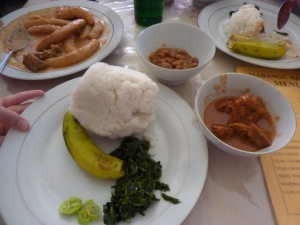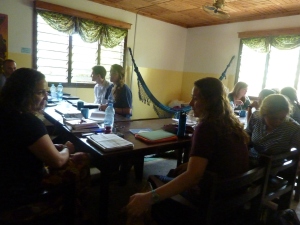
Photo by Marc Dominiani
Our first partner picture!
We are spending this week living at the PC house in Korogwe and having day-long orientation sessions at the 2Seeds office (Sam and Ana’s house). A few notes of interest about orientation:
We have lunch and dinner together everyday, which is serving as our introduction to the local food. My main takeaway- boy am I in trouble. Pretty much every meal we get a big pile of ugali, which is corn mush (think uncooked polenta or firm grits). It’s fine, but not appetizing. However, the way that you eat it involves molding it into a ball with which you pick up the rest of your food. This would be fine, except that the ugali is not solid and so gets all over your hands. Essentially you cannot eat without getting food all over your hands and everywhere else. Those of you who know me know that I eat things with my hands fairly often, but I only eat things that way when they aren’t messy and that have no sauce. This method of eating feels so dirty to me and every meal I just can’t help but wish that the ugali was a bit more solid and bread-like. There is a flat oily bread here (shaped like a crepe) called chapatti that I’m really enjoying, so we’ll see how long it takes me to get tired of it.

Ugali with greens
We are all fighting jetlag and I keep dozing off in the evening in rooms full of people chatting. I’m not the only one- there is a PC here who keeps falling asleep at random times in the middle of the day. We keep joking that she will just sleep through her project. I’ve been waking up around 5 or 6am (when the roosters start crowing). Most of the other PCs are going for walks and runs in the morning, but so far I’ve stayed inside the house out of fear of dawn mosquitos. In the next two days I expect that my body will have totally adjusted to this timezone.
As we walk around town together in a big clump we attract a lot of attention because we are an unusual sight. As we walk down the street people stare at us and shout hello. Ana responds to all of them and in some ways it feels very friendly and social- you walk down the street greeting everyone you see. I’m not sure if this is normal or just because we stand out so much. Many people, especially the children, call out ‘mzungu’ which means ‘white person’ as we pass. The kids are all really excited to see us and take so much joy from hearing us respond to them. Many of them know the words ‘hello’ ‘how are you’ and ‘good evening sir.’ They yell these indiscriminately at us even after we’ve said hello. Although it feels friendly, I’m finding it a bit tiring because I want to meet all the people we are greeting and know who they are, but we don’t have time. It doesn’t really make sense to put in the time to get to know any Tanzanians until I get to the village where I actually will be living for the next year.
We’ve spent a lot of the first two days talking about big picture ideas about how to approach our projects and what it means to be a part of this organization. Some of the PCs feel like these talks are too wishy-washy to be useful, but I’m really enjoying it. Our discussions have really been affirming my belief in this organization and making me be proud to be a part of it. Some of the things they’ve said (or reiterated) that I really like:
- the means by which we do our work is more important than our outcomes. This means we want the focus to be on giving the people we work with the capacity to better their lives instead of just focusing on how many more acres of land were planted. The process and going through the process is where the change happens (otherwise we could just be donating food and be done with it.)
- 2Seeds has a huge focus on metrics and reevaluation at all levels of the organization. I’ve seen this in play with the improvements they’ve made to the program over last year. We are required to include in our project ways to measure success and to go back periodically and evaluate how we are doing and if changes need to be made.
- the focus is really on the specific communities and people- 2Seeds was specifically designed to avoid a one-size-fits-all approach. This means that we cannot move forward without involving the community members; the structure of our projects is built so that we must actually form the strong relationships and partnerships the website claims to foster. It also means that we must do what works in the communities and we cannot simply impose our way of doing things.
The organization also puts a lot of effort into taking care of our personal well-being and professional development, which is awesome. I feel like I am going to grow a lot during this year and am really pleased that we are having dedicated trainings on topics like goal setting, budgeting and finances, and communication around difficult topics. It feels good know that I’m with an organization that is really trying to give us the skills to improve our own lives as well as trying to give Tanzanians the ability to their lives. We’ve also had a lot of conversations that acknowledge the difficulty of what we’re doing and the problems we may encounter this year. Although these are hard conversations to have, I feel like I’m really going into this year with both eyes open and am fairly prepared for both the good and bad parts of this next year.

PCs in the office during orientation








